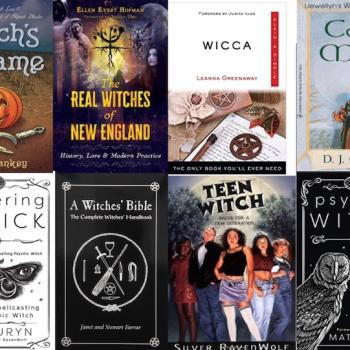A friend of mine asked me if I would be interested in circling with him and his coven at a festival I was attending many moons ago. I waffled, but then he mentioned that he’d be calling down the god Herne. Herne and I had never been especially close, but he’s an antlered god, of course I was in!
Since the ritual was in a tradition outside of my own I was little uncomfortable at first, but I get settled in as things move along. Eventually my friend beings drawing down Herne and I can see a change come over him. His eyes become different, his mannerisms change, and he begins to speak with an odd lilt to his voice. Sometimes a particular drawing down just feels more “real,” and this was one of those times.
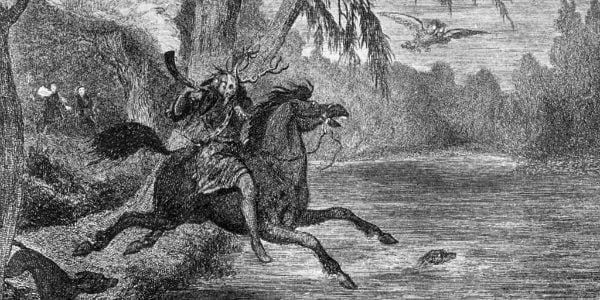
When Herne comes to full awareness in the body of the High Priest, he begins walking around the circle and sharing a hug or a bit of wisdom with all of the ritual’s participants. As Herne gets closer to me I envision him standing before me, our eyes locked, his hands upon my shoulders, mine on his, with the two of us hailing each other as brothers. That was what I was expecting, what I got was something entirely different.
So Herne comes up to me, looks me in the eye for just a second and says “So Jason, everyone but me . . .” and then he laughs a bit before moving along to the next person. My reaction was just to stand there, slack jawed and embarrassed. I had never been dissed by a god before, and I found it troubling. Pissing off a god was not high on my “to do” list, in fact it was on my “never to do list,” but what’s done is done. The only way forward after that was to try and forge some type of relationship with him.
A few months before that incident with Herne he came up during a talk I was giving on The Horned God. I had probably just gotten done with rattling off a whole bunch of stuff about Cernunnos when someone asked me about Herne. My response was dismissive and entirely unsympathetic. One of the problems with Herne is that his origins lie in a folk-tale, and there aren’t any legends about him being a god, or even any iconography to suggest that he was seen as a deity. I think new gods and goddesses emerge over time, but I’ve always felt most drawn to the “old ones.” With the exception of Cernunnos, I like my gods with myths and at least some evidence of their worship in ancient pagandom. Herne has none of those things.
Now that doesn’t mean that there aren’t stories about Herne. I first encountered Herne back when I was seven years old when he turned up in DC Comics over-sized “Ghosts” limited collector’s edition comic. That particular comic (which scared the bejesus out of me at the time) contained stories about Marie Laveau, a “demon-hand” that made John Wilkes Booth do horrible things, and Herne the Hunter. In the comic Herne was a ghost; a specter who only appeared before the deaths of important figures or impending calamity (like World War II).
Our opinions about stuff are often shaped by incidents that happen when we are young, such was my case with Herne. When re-discovering Herne as an adult I first encountered him as a shadow of Cernunnos. There are a lot of Pagans who write about Herne as an aspect of a more modern version of Cernunnos. I was comfortable with this interpretation for several years before I really began researching the story of Herne. The truth about Herne the Hunter is a bit more problematic, but there is a definite paper trail that you can use to trace his evolution from folk-tale to full fledged Pagan god.
Herne the Hunter makes his first literary appearance in Shakespeare’s* play The Merry Wives of Windsor which was first performed in 1597. Herne doesn’t have a part in the play; he is simply mentioned as being a part of the local folklore in Windsor England:
Sometime a keeper here in Windsor Forest,
Doth all the winter-time, at still midnight,
Walk round about an oak, with great ragg’d horns;
And there he blasts the tree, and takes the cattle,
And makes milch-kine yield blood, and shakes a chain
In a most hideous and dreadful manner.
You have heard of such a spirit, and well you know
The superstitious idle-headed eld
Receiv’d, and did deliver to our age,
This tale of Herne the Hunter for a truth.
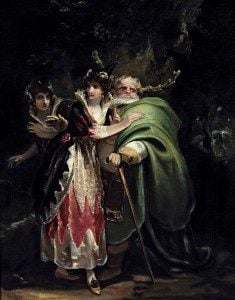
The story of Herne began as a folk-tale, probably in the late 1300’s long after England had been Christianized. We can sort of date the story of Herne because it has real historical figures in it, in this case King Richard II. There are several different versions of the story, which is common in folklore, but most versions contain the same basic elements.
In almost every story Herne was an exceptional young hunter in the employ of King Richard II (1367-1400). One day while out hunting, Herne and the King broke off from the rest of the royal hunting party and cornered a giant white stag. Herne managed to shoot the animal with his bow, but the shot was not a lethal one. The King and his loyal huntsman continued to track the beast, eventually cornering it in a remote part of the forest. Boxed in by the two hunters the stag charged them. The King was directly in the path of the beast and Herne jumped between the stag and his King, saving Richard’s life. The act of bravery cost Herne his life, but before he died he managed to kill the stag with his hunting knife.
The King rushed to Herne’s side, but it was too late, Herne was dead. The King was distraught, and when the rest of the hunting party found him he was crying over the body of his comrade, promising the world to anyone who could revive the brave Herne. From the back of the hunting party a wizard came forward, in most accounts he is named Phillip Urswick. Urswick said that he could revive Herne, but that Herne would lose all of his hunting and tracking skills in the process.
The King told Urswick to proceed and the wizard fed the corpse of Herne strange plants and potions. Before Urswick was done he went to the dead stag and removed the animal’s horns, placing them on top of Herne’s head. The weird spell worked and Herne lived, but true to the wizard’s word, Herne lost all of his hunting and tracking skills. After several days of living without his greatest loves Herne went mad and ran into the woods and hung himself on a great oak tree.
There have been many romantic embellishments to this story over the years. In some versions there are other hunters who betray Herne, and turn Richard against him. In these instances the King usually hangs Herne, and then the ghost of Herne causes Windsor Forest to lie barren of game until justice has been served. In most cases that means the death of the huntsmen who betrayed him. Usually the story contains Herne’s ghost talking to the King and Herne forgiving Richard for the series of unfortunate events that transpired.
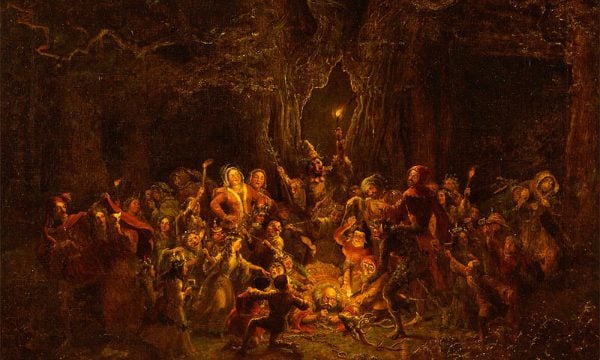
In later years it was said that Herne’s ghost roamed Windsor Forest, generally appearing only before a great tragedy. The ghost of Herne has been spotted before the deaths of several British monarchs, and his last appearance was just before the start of World War II. Sometimes the ghost of the stag Herne was hunting in the original folk-tale shows up in Windsor Forest. Some view the stag as Herne himself, and others as the creature that brought about Herne’s human downfall. In addition to the various hauntings, Herne was said to lead “the Wild Hunt” through Windsor Forest, usually bringing ill to anyone who happened to spot him with his spectral riders.
The Wild Hunt is a common motif throughout European folklore. The Wild Hunt was originally attributed to pagan gods, particularly Norse and Germanic ones. As Europe became Christianized the Wild Hunt turned into a ghostly hunting party, a hunting party that usually preyed on the souls of the wicked, though the innocent tended to get swept up in it from time to time as well. People were generally afraid of the Wild Hunt, and in most cultures it was said to happen on a specific day of the year, usually the winter solstice, or sometimes the cross-quarter holiday of Samhain (Halloween).
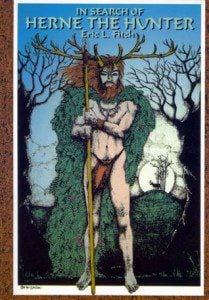
One interesting theory on the origin of the name Herne comes from Pagan writers Janet and Stewart Farrar. They’ve theorized that the name Herne comes from the sound of a stag’s call, which they interpret as sounding like “herne.” Having never heard a stag’s call I have no idea if this is true or not, but it’s just as likely as anything else.
If Herne’s origins lie with those of a pagan god, I think that god is probably the Germanic Woden who would have arrived in Great Britain when it was invaded by the Saxons. Like Herne, Woden hung himself on a tree, but in the case of the Germanic god it was in a quest for knowledge (that’s how we got the runes) and he too was said to lead a Wild Hunt. Hangings and Wild Hunts, as of today, seem to have very little to do with Cernunnos, and a lot to do with Woden. Woden also rode a magical horse, and Herne has appeared mounted many times in Windsor. Woden was also sometimes given the title Herian, which sounds similar to Herne, though that’s probably dead end.
It’s impossible to say with any certainty where the story of Herne came from. It could be a combination of a stag’s call, legends of Woden, and long lost images of Cernunnos. It could also have evolved from a ghost story designed to keep children out of Windsor Forest, taking on more elements over time. Herne could have human origins too. There was a poacher operating in Windsor with the last name of Horne who was hung in the early 1500’s, and early printed versions of Shakespeare’s play spell Herne with the poacher’s last name.
In some ways it’s completely irrelevant where the story comes from. Herne’s worship in the here and now is probably what matters the most, a fact I have to constantly remind myself of. Herne wouldn’t be the first god worshipped in Modern Paganism with rather dubious origins.
Herne was first used in Modern Pagan Ritual back in 1957, and was referred to as a sun-god listed alongside Lugh, (King) Arthur, and the Arch-Angel Michael (a strange hodge-podge of deities and entities to say the least). He shows up again in Gerald Gardner’s The Meaning of Witchcraft published in 1959 where he is called a “British example par excellence of a surviving tradition of the Old God of the Witches.” (I realize that’s the second time I’ve used that quote on this blog, but it’s so freaking cool I can’t help myself.)
We can learn a lot about Herne as a god by using the folk (and ghost) tales about him as a guide. He is a god of prophecy, the woods, and the hunt. He is a bringer of divine retribution, to be called upon when one has been wronged and there is no other recourse. He has also become the patron deity of Great Britain, alerting his country men and women when tragedy is about to strike.
As for my own dealings with Herne they’ve gotten a lot better over the last couple of years. I’ve said my apologies and I’m pretty sure I’ve been forgiven. At least I hope so, divine retribution is not something I want to experience.
*I’m actually a pretty committed Oxfordian, so I believe that Edward de Vere wrote the majority of the plays attributed to Shakespeare.










